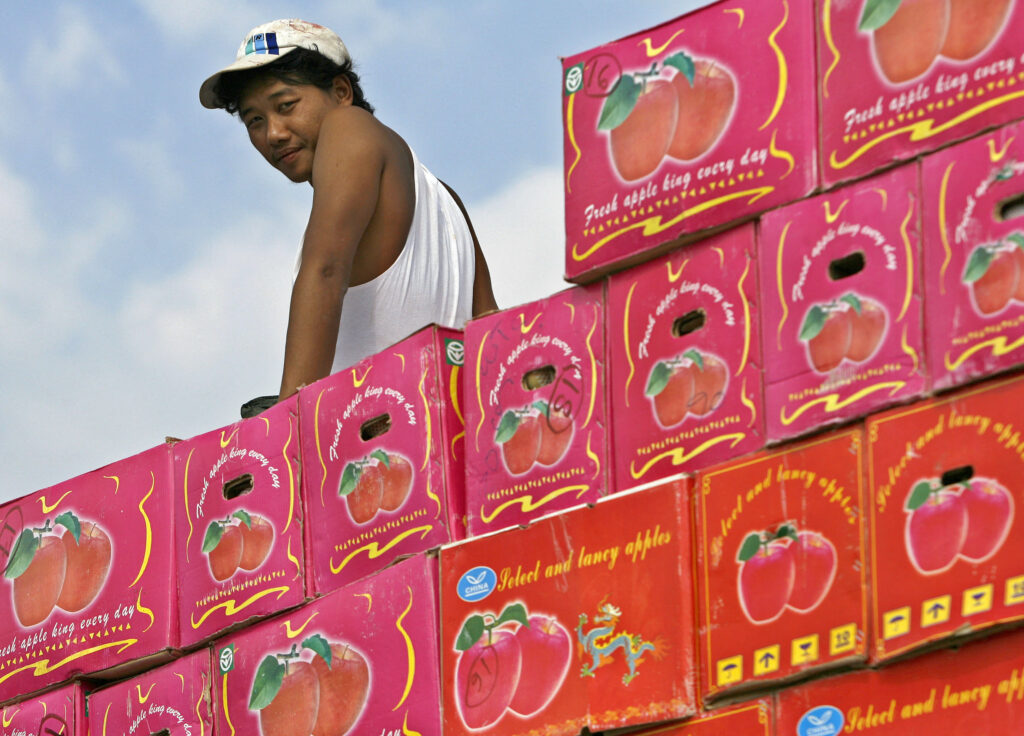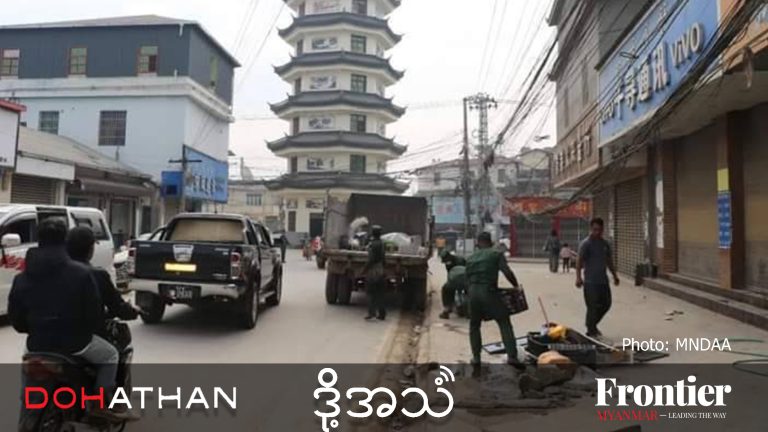Trade between the once-thriving border towns of Muse and Ruili is restarting after nearly three years, but remains restricted to a trickle of trucks, with Myanmar wary of the COVID-19 surge in China.
By FRONTIER
China’s loosening of its zero-COVID policy has led to a limited revival of once lucrative cross-border trade between the twin border towns of Ruili and Myanmar’s Muse for the first time in nearly three years.
Muse is the most important of the five Myanmar-China border trading posts. According to Ministry of Commerce data, the value of trade through Muse’s gates reached US$4.8 billion in the 2019-20 fiscal year but fell to $4 billion in 2020-21 as pandemic restrictions took hold. Trade fell much further to $700 million in the six month mini-budget period up to end-March 2022 and recovered only slightly to $1.3 billion in the next six months to October 2022.
Before the pandemic struck in early 2020, the three Muse-Ruili crossings of Man Winn, Sin Phyu and Nan Daw, in addition to two other northern Shan State gates at Kyin San Kyawt and Chin Shwe Haw, accounted for about half of all Myanmar’s land-based trade.
At the time, Ruili in Yunnan province (known as Shweli in Burmese) was a boom town thriving on cross-border trade. Fortunes were also made on the lucrative smuggling from Myanmar of narcotics, jade, animal parts and even women sold into marriage in China. Security in Muse, as in other Shan border areas, is largely contracted out to militias while a blind eye is turned to their illicit enterprises.
All three Muse-Ruili crossings were closed by China on March 30, 2020. Over the next three years, China only permitted trade at other crossings and under strict conditions, such as the requirement that Chinese drivers take the wheel of trucks from Myanmar at the border, and it limited the types of commodities that could be traded.
Ruili suffered badly under China’s zero-COVID policy, subjected to repeated lockdowns that kept people at home for long periods, with many businesses forced to shut down as China feared an influx of the virus from Myanmar. Late last year, rare street protests across China against the COVID restrictions, which were hobbling the economy and creating job losses, prompted the ruling Communist Party to reverse course and lift the restrictions almost overnight.
China and Myanmar held a bilateral trade meeting on January 3 where the Chinese side announced it would loosen border restrictions. China reopened its side of two border gates on January 8, but border officials in Myanmar said they were not yet prepared, and a limited trade only resumed on January 14.
Despite these moves, merchants on both sides remain fearful of further outbreaks of the virus and have upheld COVID-19 restrictions. While the Man Winn and Sin Phyu gates have nominally reopened, only people driving light trucks of up to six-wheels are currently allowed to pass, according to U Min Thein, deputy chair of the Muse Rice Commodity Exchange.
In addition, the junta, citing the COVID-19 infection rate in Ruili, has yet to reestablish immigration checkpoints. Sources said that infections in Muse remain low.
The Nan Daw gate, the crossing point for most foot traffic, remains closed, leaving people unable to cross back legally into their own country. However, on January 25 the junta announced it would reopen the crossing and has started issuing new “red book” border passes to residents of Muse and Namkham Township, further west along the border. These passes allow holders to cross and remain in China for one week. China has already agreed to allow Myanmar nationals that observe its COVID-19 regulations to enter at its corresponding gates.
Unequal exchange
Myanmar officials and traders complain that, during the pandemic, Chinese counterparts have often acted unilaterally and failed to sufficiently consult them before imposing restrictions.
Over the period, Myanmar traders have only been permitted to export rice, pulses, corn, oil producing vegetables, rubber, onion, chilli, marine products, sugar cane, watermelon and muskmelon through Kyin San Kyawt. Chinese merchants, meanwhile, have driven industrial raw materials and finished consumer goods into Myanmar.
In addition, China banned drivers from passing through Kyin San Kyawt into Yunnan directly. A short-haul relay system was put in place, with an injunction that goods must pass between trucks and drivers at various checkpoints along the route. Critics say the policy greatly delayed and increased the costs of trade.
The Chin Shwe Haw gate, guarded by military proxy the Kokang Border Guard Force in the Kokang Self-Administered Zone, was temporarily closed in October 2021 but reopened the following month. The gate is a crucial crossing point for Chinese tourists wishing to visit the casinos of Laukkai. However, sources said imports from China at the gate were limited to goods relating to the prevention of COVID-19.
Myanmar traders said China’s restrictions have cost them greatly.
“China closed the border gates at the height of the pandemic, and so many Myanmar traders got hurt at that time. Truck drivers who had reached the border found they couldn’t enter China, and some goods rotted. China shouldn’t have restricted the flow of goods because of the pandemic – these problems would’ve been better solved by negotiations between responsible officials of the two countries,” trader Ko Hein Naing told Frontier.
“Myanmar traders have faced real difficulties because of China’s COVID rules. They’re forced to take tests and wear protective gear. Trucks and goods still have to be sprayed with sanitizers,” said Min Thein.
Traders also allege that China has established inconsistent regulations on the standards of goods exported since 2018, and that communication with Myanmar remains poor. Despite the January 3 meeting in which the reopening was discussed, those on the Myanmar side say Chinese officials again failed to give advance notice before reopening their side of the border five days later.
Reopening amid COVID concerns
Reporting from China suggests the country experienced all-time high COVID-19 infection rates earlier this month, with some estimates suggesting over 80 percent of the population has now caught the virus. Data from Johns Hopkins University shows that after almost no reported cases last year till mid-December, infections in Yunnan suddenly ballooned, with 736 cases on January 8 alone.
This situation is a concern to border authorities, Myanmar merchants and local residents, but many still hope that both sides will continue to loosen border restrictions.
“Local people around here, as well as the merchants, are worried that COVID may come back to Myanmar with border gates reopening. But I think, ultimately, everyone is hoping for business to return to normal,” a Muse-based merchant told Frontier.
Myanmar will require those crossing from China into Muse to have proof of full vaccination at least two weeks before their date of travel or a negative PCR test taken in the past 48 hours – precautions that are in line with some Asian and European countries concerned about the possible spreading of new COVID variants, especially during the mass movement of Chinese over the recent Lunar New Year period.
Those drivers entering Muse without the necessary documents will have to pay to be tested at the border and then, if positive, quarantined. Traders said the new rules would be applied for as long as infection rates remained high in China.
To enter Ruili from Myanmar, China requires drivers to take free border tests, but if they test positive they must pay for their quarantine. They can also go no further than Ruili.
“Check ahead or risk trouble”, warns the Myanmar citizens in the Shweli and Kyel Gaung Facebook group. Posts from members of the group advise truckers not to rush to the border because not all the gates are open and trade is still far from normal.
Min Thein said that once all the border gates at Muse return to normal, the relay system used at Kyin San Kyawt gate will be discontinued. Over 130 trucks are still crossing through the gate daily, he said.
However, Myanmar traders say that for border trade to truly flourish again, China needs to be more accommodating to its neighbour.
“We are always dependent on China when it comes to border trade. It always has the upper hand. If China didn’t take advantage and traded fairly then border trade with Myanmar would improve,” said Min Thein.
Boosting trade was most recently discussed in Beijing on January 16 at a meeting between Myanmar’s ambassador U Tin Maung Swe and senior Chinese trade officials. Details of the talks were not disclosed.
“The free flow of goods is beneficial for both countries. If we negotiate with each other, border trade will be back to normal before long,” said Muse-based trader Ko Hein Naing.







